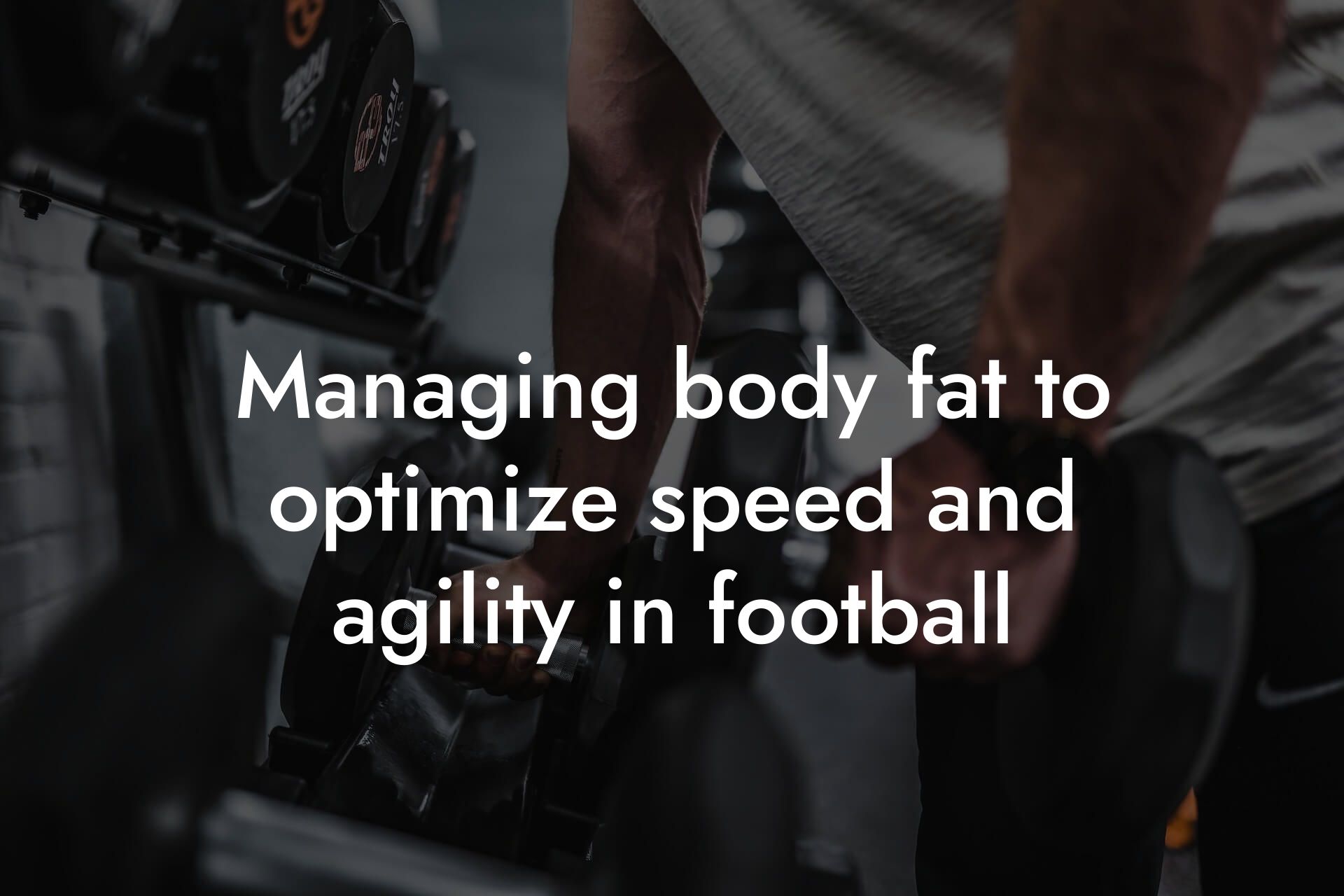As a football player, maintaining muscle mass is crucial for optimal performance on the field. During the season, it can be challenging to balance training, recovery, and nutrition to support muscle growth and maintenance. In this article, we will explore the importance of nutrition in maintaining muscle mass and provide actionable strategies for football players to optimize their nutrition during the season.
Table of Contents
- Understanding Muscle Mass and Football Performance
- The Role of Nutrition in Maintaining Muscle Mass
- Protein: The Building Block of Muscle
- Carbohydrates: Fuel for Performance
- Healthy Fats: Supporting Hormone Function
- Hydration: The Key to Optimal Performance
- Meal Frequency and Timing
- Post-Exercise Nutrition
- Supplementation: Is it Necessary?
- Frequently Asked Questions
Understanding Muscle Mass and Football Performance
Muscle mass plays a critical role in football performance. It is essential for generating power, speed, and strength, which are all critical components of success on the field. During the season, football players are at risk of losing muscle mass due to the high demands of training and competition. This can lead to decreased performance, increased risk of injury, and a longer recovery time.
The Role of Nutrition in Maintaining Muscle Mass
Nutrition plays a critical role in maintaining muscle mass. Adequate nutrition provides the necessary building blocks for muscle growth and repair. During the season, football players require a balanced diet that provides sufficient protein, carbohydrates, and healthy fats to support muscle maintenance.
Protein: The Building Block of Muscle
Protein is essential for muscle growth and maintenance. It provides the necessary amino acids for muscle repair and rebuilding. Football players require a minimum of 1.6-2.2 grams of protein per kilogram of body weight daily. Good sources of protein include lean meats, fish, eggs, dairy, and plant-based options like beans, lentils, and tofu.
Carbohydrates: Fuel for Performance
Carbohydrates provide energy for football players during training and competition. They are essential for maintaining muscle glycogen stores, which are depleted during high-intensity exercise. Football players require 2-3 grams of carbohydrates per kilogram of body weight daily. Good sources of carbohydrates include whole grains, fruits, and vegetables.
Healthy Fats: Supporting Hormone Function
Healthy fats are essential for hormone function and overall health. They provide energy and support the absorption of fat-soluble vitamins. Football players require 0.5-1 gram of healthy fats per kilogram of body weight daily. Good sources of healthy fats include nuts, seeds, avocados, and olive oil.
Hydration: The Key to Optimal Performance
Hydration is critical for football players. Adequate hydration ensures optimal physical performance, reduces the risk of injury, and supports recovery. Football players should aim to drink at least 8-10 glasses of water per day, and make sure to drink water during and after exercise.
Meal Frequency and Timing
Meal frequency and timing are critical for maintaining muscle mass. Football players should aim to eat 4-6 meals per day, spaced out every 2-3 hours. This includes 2-3 main meals and 2-3 snacks in between. Meals should be balanced and provide a mix of protein, carbohydrates, and healthy fats.
Post-Exercise Nutrition
Post-exercise nutrition is critical for recovery and muscle maintenance. Football players should aim to consume a meal or snack that provides 15-30 grams of protein and 20-30 grams of carbohydrates within 30-60 minutes after exercise. This helps to promote muscle recovery, reduce muscle soreness, and support muscle growth.
Supplementation: Is it Necessary?
Supplementation can be beneficial for football players, but it is not necessary. A well-balanced diet that provides adequate protein, carbohydrates, and healthy fats can support muscle maintenance. However, some supplements like protein powder, creatine, and branched-chain amino acids (BCAAs) can be beneficial for football players. It is essential to consult with a sports dietitian or healthcare professional before adding any supplements to your diet.
Maintaining muscle mass during the football season requires a well-planned nutrition strategy. By understanding the importance of protein, carbohydrates, and healthy fats, and implementing a balanced diet that includes meal frequency and timing, hydration, and post-exercise nutrition, football players can optimize their performance and maintain muscle mass. Remember, a well-balanced diet is the key to success on the field.
Frequently Asked Questions
What are the importance of maintaining muscle mass during the football season?
Maintaining muscle mass during the football season is crucial for optimal performance, injury prevention, and overall athletic success. Muscle mass plays a vital role in generating power, speed, and endurance, all of which are essential for football players. Additionally, maintaining muscle mass helps to reduce the risk of injuries, particularly those affecting the muscles, tendons, and ligaments.
How does nutrition impact muscle mass during the football season?
Nutrition plays a critical role in maintaining muscle mass during the football season. A well-planned diet provides the necessary building blocks for muscle growth and repair, while a poor diet can lead to muscle loss and decreased performance. Adequate protein intake, in particular, is essential for muscle protein synthesis, which helps to build and repair muscle tissue.
What are the key nutrients for maintaining muscle mass during the football season?
The key nutrients for maintaining muscle mass during the football season include protein, carbohydrates, healthy fats, vitamins, and minerals. Protein is essential for muscle protein synthesis, while carbohydrates provide energy for training and competition. Healthy fats support hormone production and overall health, while vitamins and minerals are necessary for various physiological processes.
How much protein do football players need to maintain muscle mass?
Football players require a significant amount of protein to maintain muscle mass, with daily intake ranging from 1.6-2.2 grams of protein per kilogram of body weight. This translates to approximately 120-170 grams of protein per day for a 150-pound athlete.
What are the best sources of protein for football players?
The best sources of protein for football players include lean meats, fish, eggs, dairy products, legumes, and plant-based protein powders. These sources provide all the essential amino acids necessary for muscle protein synthesis and are easily digestible.
How can football players ensure they are getting enough carbohydrates?
Football players can ensure they are getting enough carbohydrates by consuming complex carbohydrates such as whole grains, fruits, and vegetables, which provide sustained energy and support muscle function. Aim to consume 2-3 grams of carbohydrates per kilogram of body weight daily.
What role do healthy fats play in maintaining muscle mass?
Healthy fats, particularly omega-3 fatty acids, play a crucial role in maintaining muscle mass by reducing inflammation, supporting hormone production, and providing energy. Include sources such as nuts, seeds, avocados, and fatty fish in your diet.
How often should football players eat to maintain muscle mass?
Football players should aim to eat 4-6 meals per day, spaced out every 2-3 hours, to maintain muscle mass. This includes 2-3 main meals and 2-3 snacks in between, ensuring a consistent supply of nutrients throughout the day.
What are the benefits of meal planning for football players?
Meal planning is essential for football players as it ensures they are consuming the necessary nutrients to maintain muscle mass, supports optimal performance, and reduces the risk of nutrient deficiencies. A well-planned meal plan also helps to reduce stress and saves time.
How can football players stay hydrated during the season?
Football players should aim to drink at least 8-10 glasses of water per day, and make sure to drink water during and after training sessions and games. Additionally, consume electrolyte-rich beverages such as sports drinks to replenish lost electrolytes.
What are the consequences of inadequate nutrition during the football season?
Inadequate nutrition during the football season can lead to muscle loss, decreased performance, increased risk of injury, and impaired recovery. Additionally, it can also affect overall health, leading to issues such as fatigue, weakness, and illness.
How can football players monitor their nutrition and muscle mass?
Football players can monitor their nutrition and muscle mass by tracking their food intake, body weight, body fat percentage, and muscle circumference. Regularly monitoring these metrics helps to identify areas for improvement and make adjustments to their nutrition plan.
What role does supplementation play in maintaining muscle mass?
Supplementation can play a supportive role in maintaining muscle mass, particularly for football players who struggle to consume enough nutrients through their diet alone. However, it is essential to consult with a sports dietitian or healthcare professional to determine the appropriate supplements and dosages.
Are there any specific supplements that can help maintain muscle mass?
Certain supplements such as protein powder, creatine, and HMB (beta-hydroxy beta-methylbutyrate) can help support muscle mass, but it is essential to consult with a sports dietitian or healthcare professional to determine the appropriate supplements and dosages.
How can football players maintain muscle mass during the off-season?
Football players can maintain muscle mass during the off-season by continuing to consume a balanced diet, engaging in resistance training, and getting adequate rest and recovery. This helps to maintain muscle mass and prepare for the upcoming season.
What are the benefits of working with a sports dietitian for football players?
Working with a sports dietitian can provide football players with personalized nutrition plans, tailored to their specific needs and goals. This can help to optimize performance, improve body composition, and reduce the risk of injury and illness.
How can football players overcome common nutrition challenges during the season?
Football players can overcome common nutrition challenges during the season by prioritizing meal planning, staying hydrated, and seeking support from teammates, coaches, and sports dietitians. Additionally, being flexible and adaptable to changing circumstances can also help.
What are the key takeaways for maintaining muscle mass during the football season?
The key takeaways for maintaining muscle mass during the football season include consuming a balanced diet, staying hydrated, getting adequate rest and recovery, and seeking support from sports dietitians and healthcare professionals. By following these guidelines, football players can optimize their performance, reduce the risk of injury, and achieve their goals.
How can Tano Performance Group support football players in maintaining muscle mass?
Tano Performance Group offers personalized nutrition plans, training programs, and coaching services tailored to the specific needs of football players. Our team of experts provides guidance and support to help athletes achieve their goals and optimize their performance.
What are the long-term benefits of maintaining muscle mass for football players?
The long-term benefits of maintaining muscle mass for football players include improved overall health, reduced risk of chronic diseases, and enhanced athletic performance. Additionally, maintaining muscle mass can also improve bone density, reducing the risk of osteoporosis and fractures.
How can football players balance their nutrition and training goals?
Football players can balance their nutrition and training goals by prioritizing their goals, creating a schedule, and seeking support from coaches, trainers, and sports dietitians. By doing so, athletes can optimize their performance, reduce the risk of injury, and achieve their goals.
What are the common mistakes football players make when it comes to nutrition and muscle mass?
Common mistakes football players make when it comes to nutrition and muscle mass include inadequate protein intake, poor meal planning, and neglecting hydration. Additionally, failing to listen to their bodies and ignoring signs of fatigue and injury can also hinder performance and muscle mass.
How can football players stay motivated to maintain muscle mass during the season?
Football players can stay motivated to maintain muscle mass during the season by setting realistic goals, tracking their progress, and celebrating small victories. Additionally, having a support system, such as teammates and coaches, can also help to stay motivated and accountable.
Here are some related articles you might love...
- The role of bone density in preventing football injuries
- Managing body fat to optimize speed and agility in football
- Recovery strategies for football athletes: Nutrition and rest
- Balancing mass and speed: A guide for football athletes
- How DEXA scans can benefit professional football players
- How to maintain peak performance during the football season
- The importance of body composition in football performance
- Strength training tips for football players
- Off-season fitness programs for football players
Zak Faulkner
Zak Faulkner is a leading authority in the realm of physical health and body composition analysis, with over 15 years of experience helping professionals optimise their fitness and well-being. As one the experts behind Tano Performance Group, Zak has dedicated his career to providing in-depth, science-backed insights that empower clients to elevate their physical performance and overall health.
With extensive knowledge of DEXA technology, Zak specializes in delivering comprehensive body assessments that offer precise data on body fat, muscle mass, bone density, and overall physique. His expertise enables individuals to make informed decisions and achieve their fitness goals with accuracy and confidence. Zak’s approach is rooted in a deep understanding of human physiology, combined with a passion for helping clients unlock their full potential through personalised strategies.
Over the years, Zak has earned a reputation for his commitment to excellence, precision, and client-focused service. His guidance is trusted by top professionals who demand the best when it comes to their health. Whether advising on fitness programs, nutritional strategies, or long-term wellness plans, Zak Faulkner’s insights are a valuable resource for anyone serious about taking their health and fitness to the next level.
At Tano Performance Group, Zak continues to lead our Content Team revolutionising how professionals approach their physical health, offering unparalleled expertise that drives real results.




